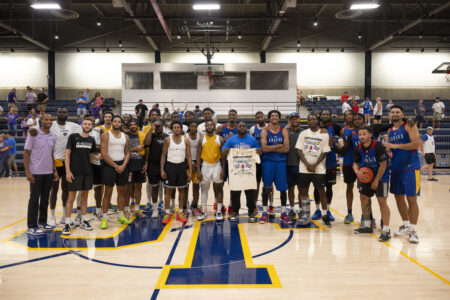KU denies open records request seeking more information about NCAA allegations

photo by: Chris Conde
Strong Hall on the University of Kansas campus is shown on Sept. 13, 2018.
While the University of Kansas has publicly released the list of recruiting allegations the NCAA has made against the school’s basketball program, it is declining to release other basic information about the case.
The University of Kansas on Thursday denied a Journal-World records request for a cover letter and other correspondence the NCAA sent to the university along with its recent Notice of Allegations.
The reason that the cover letter and other materials can’t be seen by the public? The university is seemingly arguing the NCAA is a “private individual,” and thus under Kansas Open Records law KU doesn’t have to release such correspondence from individuals.
But Max Kautsch, a Lawrence-based attorney who specializes in open-government issues, said the provision the university cited in its denial is misapplied. He said the provision was created to protect correspondence between private residents and lawmakers, which does not apply to the NCAA or KU.
“The legislative history suggests that the exception relied upon by the university to deny the paper’s request was designed to protect constituent correspondence with lawmakers,” he said. “As that is not the circumstance here, the university should reconsider its decision to deny the paper’s request on this basis.”
On Sept. 23, the university confirmed it had received a Notice of Allegations — the NCAA’s equivalent of an indictment — which charges the KU athletics program with lack of institutional control, three Level 1 violations in the men’s basketball program and coach Bill Self with a “responsibility charge.” Level 1 violations are deemed the most serious and can include penalties such as scholarship reductions and postseason bans.
Additionally, the KU football program is charged with Level 2 violations, which include allowing an extra coach to work during practice under former coach David Beaty.
After receiving the allegations from the NCAA, the university published the document with some information redacted.
Following the release of the allegations, the Journal-World used the open records law to request the cover letter that presumably was included as part of the Notice of Allegations the university received. The Journal-World sought the letter, along with any other documents sent with the NOA, to determine if there was additional information about the NCAA’s investigation, the appeal process or other matters that the public had a right to know about the high-profile case. The newspaper also requested a time-stamped copy of the letter to more precisely determine when the university received the information from the NCAA.
In its denial of the request, the university cited a provision in the open records act that allows public agencies to deny records requests for correspondence with private individuals.
The provision states: “Correspondence between a public agency and a private individual, other than correspondence which is intended to give notice of an action, policy or determination relating to any regulatory, supervisory or enforcement responsibility of the public agency or which is widely distributed to the public by a public agency and is not specifically in response to communications from such a private individual.”
Kautsch said the application of the provision does not apply because no constituency is being protected in the denial. He said other provisions in the state’s open records act perhaps could have been used to deny the Journal-World’s request.
In its written response to the Journal-World, KU gave no indication about the content of the letter or other materials that caused the university to determine it should not publicly release the information. The provision of the Kansas Open Records Act cited by the university is discretionary, meaning even if the university determined the information was from a private individual, the school could still decide to release the information.
The university did not respond to the Journal-World’s request for further clarification of its denial.







